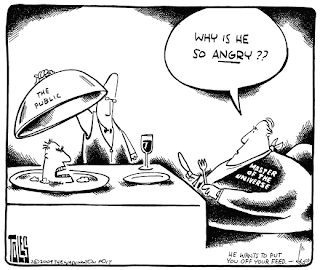If You Read Nothing Else About the Financial Crisis Read (and Remember) This…
 Courtesy of Jesse’s Café Américain
Courtesy of Jesse’s Café Américain
"The crash has laid bare many unpleasant truths about the United States. One of the most alarming, says a former chief economist of the International Monetary Fund, is that the finance industry has effectively captured our government—a state of affairs that more typically describes emerging markets, and is at the center of many emerging-market crises.
If the IMF’s staff could speak freely about the U.S., it would tell us what it tells all countries in this situation: recovery will fail unless we break the financial oligarchy that is blocking essential reform. And if we are to prevent a true depression, we’re running out of time."
The Atlantic
The Quiet Coup
By Simon Johnson
May 2009
…But I must tell you, to IMF officials, all of these crises looked depressingly similar…
…The downward spiral that follows is remarkably steep. Enormous companies teeter on the brink of default, and the local banks that have lent to them collapse. Yesterday’s “public-private partnerships” are relabeled “crony capitalism.” With credit unavailable, economic paralysis ensues, and conditions just get worse and worse. The government is forced to draw down its foreign-currency reserves to pay for imports, service debt, and cover private losses. But these reserves will eventually run out. If the country cannot right itself before that happens, it will default on its sovereign debt and become an economic pariah. The government, in its race to stop the bleeding, will typically need to wipe out some of the national champions — now hemorrhaging cash — and usually restructure a banking system that’s gone badly out of balance. It will, in other words, need to squeeze at least some of its oligarchs.
Squeezing the oligarchs, though, is seldom the strategy of choice among emerging-market governments. Quite the contrary: at the outset of the crisis, the oligarchs are usually among the first to get extra help from the government, such as preferential access to foreign currency, or maybe a nice tax break, or—here’s a classic Kremlin bailout technique—the assumption of private debt obligations by the government. Under duress, generosity toward old friends takes many innovative forms. Meanwhile, needing to squeeze someone, most emerging-market governments look first to ordinary working folk—at least until the riots grow too large…
From this confluence of campaign finance, personal connections, and ideology there flowed, in just the past decade, a river of deregulatory policies that is, in hindsight, astonishing:
- insistence on free movement of capital across borders; the repeal of Depression-era regulations separating commercial and investment banking;
- a congressional ban on the regulation of credit-default swaps;
- major increases in the amount of leverage allowed to investment banks;
- a light (dare I say invisible?) hand at the Securities and Exchange Commission in its regulatory enforcement;
- an international agreement to allow banks to measure their own riskiness;
- and an intentional failure to update regulations so as to keep up with the tremendous pace of financial innovation.
The mood that accompanied these measures in Washington seemed to swing between nonchalance and outright celebration: finance unleashed, it was thought, would continue to propel the economy to greater heights…
Looking just at the financial crisis (and leaving aside some problems of the larger economy), we face at least two major, interrelated problems. The first is a desperately ill banking sector that threatens to choke off any incipient recovery that the fiscal stimulus might generate. The second is a political balance of power that gives the financial sector a veto over public policy, even as that sector loses popular support…
At the root of the banks’ problems are the large losses they have undoubtedly taken on their securities and loan portfolios. But they don’t want to recognize the full extent of their losses, because that would likely expose them as insolvent. So they talk down the problem, and ask for handouts that aren’t enough to make them healthy (again, they can’t reveal the size of the handouts that would be necessary for that), but are enough to keep them upright a little longer. This behavior is corrosive: unhealthy banks either don’t lend (hoarding money to shore up reserves) or they make desperate gambles on high-risk loans and investments that could pay off big, but probably won’t pay off at all. In either case, the economy suffers further, and as it does, bank assets themselves continue to deteriorate—creating a highly destructive vicious cycle…
In my view, the U.S. faces two plausible scenarios. The first involves complicated bank-by-bank deals and a continual drumbeat of (repeated) bailouts, like the ones we saw in February with Citigroup and AIG. The administration will try to muddle through, and confusion will reign…confusion and chaos were very much in the interests of the powerful—letting them take things, legally and illegally, with impunity. When inflation is high, who can say what a piece of property is really worth? When the credit system is supported by byzantine government arrangements and backroom deals, how do you know that you aren’t being fleeced? (This is where the US is today – Jesse)
The second scenario begins more bleakly, and might end that way too…
Read the complete essay here.
Simon Johnson, a professor at MIT’s Sloan School of Management, was the chief economist at the International Monetary Fund during 2007 and 2008. He blogs about the financial crisis at baselinescenario.com, along with James Kwak, who also contributed to this essay.


